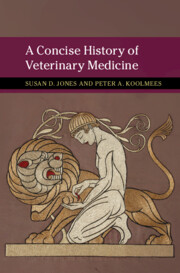Book contents
- A Concise History of Veterinary Medicine
- New Approaches to the History of Science and Medicine
- A Concise History of Veterinary Medicine
- Copyright page
- Contents
- Illustrations
- Tables
- Note on Translations
- Preface
- Introduction
- 1 Animal Healing in Sacred Societies, 1500–1700
- 2 Animal Healing in Trade and Conquest, 1700–1850s
- 3 Formal Education for Animal Healing
- 4 Veterinary Institutions and Animal Plagues, 1800–1900
- 5 Veterinary Medicine in War and Peace, 1900–1960
- 6 Food, Animals, and Veterinary Care in a Changing World, 1960–2000
- 7 Veterinary Medicine and Animal Health, 2000–2020
- Epilogue
- Book part
- Further Reading
- Index
7 - Veterinary Medicine and Animal Health, 2000–2020
Published online by Cambridge University Press: 11 August 2022
- A Concise History of Veterinary Medicine
- New Approaches to the History of Science and Medicine
- A Concise History of Veterinary Medicine
- Copyright page
- Contents
- Illustrations
- Tables
- Note on Translations
- Preface
- Introduction
- 1 Animal Healing in Sacred Societies, 1500–1700
- 2 Animal Healing in Trade and Conquest, 1700–1850s
- 3 Formal Education for Animal Healing
- 4 Veterinary Institutions and Animal Plagues, 1800–1900
- 5 Veterinary Medicine in War and Peace, 1900–1960
- 6 Food, Animals, and Veterinary Care in a Changing World, 1960–2000
- 7 Veterinary Medicine and Animal Health, 2000–2020
- Epilogue
- Book part
- Further Reading
- Index
Summary
The numbers of pets, availability of goods and services for them, and the veterinary profession’s attention to companion animal medicine are increasing (especially in Asia and Latin America). The concept of "anthropomorphism" (attributing human characteristics to animals) contributes to the idea that family pets are worthy of expensive care. Animal welfare activism expanded in Western societies and became politicized in Europe. These changes led to reductions in the use of laboratory animals and veterinarians’ increased attention to animal suffering. While traditional healing systems are often combined with Western veterinary medicine around the world, in some places the standard of animal care was based on that of human hospitals. Veterinarians adopted new technologies, including CT and MRI scanning and genetic testing. Personal computers, the internet, and mobile phones have revolutionized veterinary practice in some areas; this required veterinarians to learn new skills. In 2011–2012, veterinarians celebrated the World Veterinary Year, (250th anniversary of the first European veterinary school) and the eradication of rinderpest from the world (a triumph for veterinary international cooperation). Veterinarians have been major drivers of "One Health," the most recent effort to combine all aspects of health care for animals, the environment, and humans to address ecosystem destruction and prevent disease outbreaks.
Keywords
- Type
- Chapter
- Information
- A Concise History of Veterinary Medicine , pp. 329 - 368Publisher: Cambridge University PressPrint publication year: 2022



